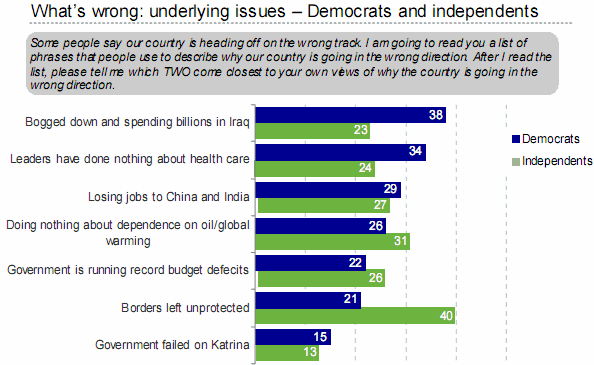Everything Sucks, I Blame Mexicans
Had Headline of the Day honors not already been awarded, Matt Yglesias would be in strong contention for his post “Everything Sucks, I Blame Mexicans.”
It’s his encapsulation of this chart from a report [PDF] produced by leading Democratic strategists:
Of course, as his commenters point out, “borders left unprotected” is rather vague and could evoke fears of terrorism rather than just illegal immigration. Still, it’s amazing that border control is in the top two concerns of 40 percent, a higher percentage even than the war in Iraq.
It’s likely true that much of this fear is “founded on the inaccurate perception that illegals are hogging up tons of public services and tend to be focused in rural areas where few immigrants live” and is thus irrational. It goes beyond that, though, into the cultural realm, where people get the sense that they’re surrounded by unassimilated people who speak another language. That perception, of course, is much more likely to be felt among those in relatively poor areas, since that’s where most migrant labor lives. Sure, a lot of immigrants flock to the cities and their service economies but many also head to the rural areas for work in the agriculture (such as the Tyson chicken plants) light manufacturing (say, the Dalton, Georgia carpet factories) sectors. That’s an increasing fact of life in rural America.
Those of us who work in the knowledge industry tend to be relatively isolated from the phenomenon or able to benefit from the abundance of cheap labor that immigration, illegal or otherwise, provides. We’re neither part of the same labor pool nor living in the same neighborhoods, thus the fears seem irrational. That’s not true for everyone.







Im not sure about this analysis. Most knowledge workers live in highly heterogenous metropolitan regions. While the neighborhood level may be homogenous–particularly in suburban areas–people in the big metro regions of New York, Chicago, LA, DC, etc… interact with immigrants all the time and realize that they perform integral labor for the functioning of their daily lives.
Furthermore, people in the knowledge industry are generally better educated and with better education comes a greater degree of tolerance (as well as a recognition of the complexity of such issues as immigration). They are less likely to fall prey to simplistic demagoguery.
I’m not sure that’s any more so than in the rural areas and suburbia. They may be more likely to pass them walking on the streets or ride with them on the subway but they’re unlikely to shop at the same Wal-Mart.
Sure. But it’s easier to be tolerant about things that are abstract. The universities, think tanks, and opinion magazines aren’t hiring a lot of illegal immigrants to do their research.
“They may be more likely to pass them walking on the streets or ride with them on the subway but they’re unlikely to shop at the same Wal-Mart.”
In fact, those of us in rural (or semi-rural, in my case) areas are *more* likely to shop at the same Wal-Mart as immigrants, because there’s only the one around. When I lived in Huntsville (a semi-urban area, by contrast), we had about 6 Wal-Marts in town. It was quite easy to tell within minutes of walking into the store whether “richer” or “poorer” people shopped at that particular one. As silly as it may sound when you’re talking about Wal-Mart, the Wal-Mart’s in richer areas were definitely more “upscale” than the others.
I digress from the point that caused me to post, however. It’s easy for an analyst or an economist to call fear of immigrants “irrational”. I even agree with this assessment. For the economy as a whole, the efficiency they offer is better than protecting somebody else’s bloated job. However, it’s an entirely different story when it’s *your* job in the balance, and I wouldn’t say that it’s an irrational fear for that person.
The key is the independants. The dems are going to vote dem no matter what in 2008. The odds of peeling large numbers off the dems is just not good. But as always, the dems can be persuaded. That of course is the real problem for Hillary in her flip flop in last nights debate about giving illegal aliens driver license. With the party faithful, it ranks 6 out of 7 in terms of imporatnce. But for the indies, it was a clear chart topper. The GOP has gotten that message as per their candidate’s latest pronouncements.
The other thing to note is Iraq. While a clear top concern among the democrats, it only hit 38%. To read the MSM, you would expect this to be north of 80%. And among indies, it ranks 6 out of 7. So think about that dynamic. The number one issue for dems is #6 for indies and the number one issue for indies is #6 for dems. Not exactly a match made in heaven to slalom through the primaries and then head for the general election.
I also have to take exception to the dependance on oil/global warming question. Those are two seperate issues. You can have great reasons to be concerned about dependance on oil and not believe the hype about global warming. Of course, I suspect that if they had just worded it about global warming, they would have exposed another wedge between the dems and the indies.
Right. The antecedent for “they” in that sentence was “people in urban areas.”
Yep. That’s the point of the last paragraph of the post.
Triumph; So Electricians, Mechanical Engineers, Machinists,etc, are not as well educated as journalists?
As far as falling prey to simplistic demagoguery, have you even VISITED a university campus lately?[or would you characterize their demagoguery as complex?][lol]
Floyd is right. I am a senior and at the present moment I am sitting in the library of a major univ. where I am a student. I would dare to guess that about 25% of all the students here are foreign born. Considering that 15,000 native students per year or denied I find this rather troubling. The Hispanic population has exploded as well so they are not just picking fruit. While I agree that some diversity is good I don’t agree when American students who have no other recourse are denied resources. They don’t have the options made available to others. As a sociology major I can ssay with some certainty that we will face competition on all levels in the near future because all sectors of industry seek to saturate the pool of skilled workers. If you truly believe that the reason that they wish to expand the skilled worker visas is because ther is ashortage of available workers then you have been shammed. I have watched friends graduate and apply for those same jobs and be denied. The true reason is that people from India and China work for less money because they send it home where it is worth much more to them. This is the exact same dynamic that drives illegal immigrants. In Mexico they avg. 2-3,000 dollars per year. They come to the U.S. and make ten times that amount in one year. Now the question is are they really hard workers or is it just that we provide one hell of an incentive? Answer: If I make $30,000 per year and I could go to Canada and make $300,000 per year I would put slavery to shame and so would most of you. STOP PORTRAYING AMERICANS AS LAZY. WE HAVE TO LIVE HERE AT WHAT MAY BE CONSIDERED THE END OF THE EARTH AS FAR AS PROSPERITY. WE HAVE NOWHERE TO RUN AND GENERATIONS OF MANY OF OUR FAMILIES IS WHAT MADE THIS COUNTRY SO GREAT. IF WE CAN’T HELP EVERY POOR COUNTRY IN THE WORLD THEN WE SHOULD NOT BE SELECTIVE. MANY COUNTRIES YHAT ARE POOR ARE THAT WAY AS A DIRECT RESULT OF CAPITALIST GREED, THE SAME FORCE THAT CURRENTLY DRIVES IMMIGRATION, ONLY UNDER THE GUISE OF HUMANITARIAN CHARITY.
I was in the “knowledge” business for 35 years and have a BA (obtained when a Bachelor’s was worth something).
What part of of “illegal” do the sophisticates not understand?
Ignoring/permitting illegal immigration is as intellectually dishonest as affirmative action. Both may be “sophisticated” in academic and beltway circles, but to the rest of us, it’s really not very complicated.
If it walks like a duck and quacks like a duck, its a duck.
But then, my 35 years in the securities business meant making complicated software work – or be unemployed.
Certainly not the Darwinian pressure-cooker that very many inside the beltway or on a campus could survive.
James, you state that from your place in the world the fear of illegal immigration seems irrational. Perhaps being in that place also makes you see as irrational (which you seem to have implied in the past) how many people want universal healthcare or who see the current healthcare system as not a very good one. With all due respect, if most people had the same healthcare that you do, they probably would feel the same way you do about the topic…
You may poo poo it as such, but when every one of my clients (building $500k to $10M homes) has a crew on site with whom they can not communicate, it has nothing to do with ‘public services’ and everything to do with making sure they are getting what they are paying for. And hardly irrational.
The problem isn’t a substandard product, it’s that corrections and/or changes cant be transmitted in a timely fashion… and that costs money.
Undocumented aliens have been in the country by the millions for years, and only recently have the masses scooped this up from the talking heads to make it a top issue of the day. With enough news stories and well-done metaphors we could probably convince millions of voters that our top priority should be defeating the emir of Gondwanaland. Issues like crime and drugs and social security surge and fade in these polls all the time based on what strategists tell TV to tell us. No doubt immigration issue is aided to the top by the increase in Spanish speakers in places they were until recently no so often found, but whether we get riled or or not about it the immigrants aren’t going away and we will eventually just tire of complaining about it and move on to something else.
When we do, will it have been worth it to the Republican party? While it seems clear that the Republicans will be able to exploit the issue quite well for the next cycle or two, I wonder at what long term cost to the party? Latino voters may remember the hostility for years to come, perhaps making this period the defining one for their party identification for years and years after other voters have moved on to other “top issues.” To gain a few seats in the next election, the GOP may be laying the seeds for a blue Florida, Arizona, Nevada and maybe even Texas in 2020, and if those states go blue I don’t know where the votes are going to come from.
Who hired those crews? Couldn’t your clients demand that legal workers be hired if it would make sure they get what they are paying for?